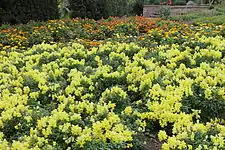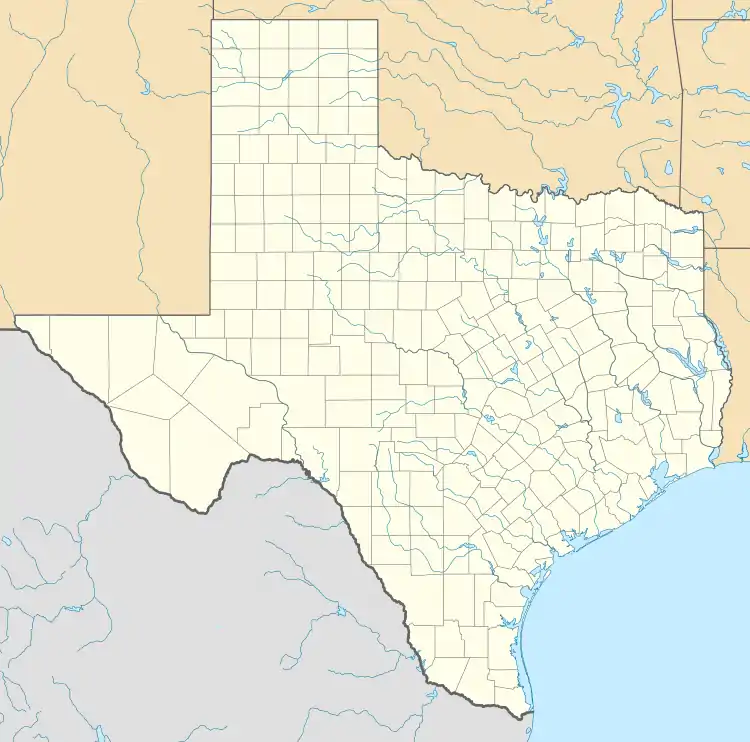San Antonio Botanical Garden
The San Antonio Botanical Garden is a 33-acre (130,000 m2), non-profit botanical garden in San Antonio, Texas, United States, and the city's official botanical garden.

| San Antonio Botanical Garden | |
|---|---|
.jpg.webp) | |
 San Antonio Botanical Garden  San Antonio Botanical Garden | |
| Type | Botanical garden |
| Location | 555 Funston Place San Antonio, Texas 78209 |
| Coordinates | 29.4589°N 98.4571°W |
| Area | 33 acres (13 ha) |
| Opened | 3 May 1980 |
| Managed by | John Troy |
| Visitors | 150,000[1] |
| Status | Open year round |
| Website | sabot |
History
The garden was first conceived in the 1940s by Mrs. R. R. Witt and Mrs. Joseph Murphy, who organized the San Antonio Garden Center. The two went on to develop a master plan for a city botanical center in the late 1960s. The site of the master plan was a former limestone quarry and waterworks area owned by the city. Voters approved $265,000 in bonds in 1970, which was the catalyst for funding the new gardens. Ground was broken for the new facilities on July 21, 1976 and the San Antonio Botanical Gardens officially opened to the public on May 3, 1980.
The gardens have had two major additions since opening. On February 29, 1988 the Emilio Ambasz designed Lucile Halsell Conservatory opened to the public and later that same year the historic Sullivan Carriage House was moved brick by brick to the botanical garden. Restoration of the building began in 1992, with formal dedication in 1995. The botanical gardens is also undergoing an extensive expansion project including expanding some of the gardens, a local farmers market, and more parking.
Features
Today the garden consists of the Lucile Halsell Conservatory, formal and display gardens, native gardens, an overlook tower and the Sullivan Carriage House:
- Lucile Halsell Conservatory (1988) - Designed by award-winning, Argentinian architect Emilio Ambasz this subterranean structure consists of five climate specific greenhouses surrounding a central courtyard. Specimens housed in the structure include alpine plants, aquatic plants, cacti and succulents, carnivorous plants, epiphytes, ferns and aroids, tropical fruits, and palms and cycads. The building won several architectural design awards.
- Gardens - Entry Gardens, Garden for the Blind, Gertie's Garden, Herb Garden, Formal Beds, Fountain Plaza, Kumamoto En, Old Fashioned Garden, Ornamental Grass Garden, Rose Garden, Sacred Garden, Biblical garden, Shade Garden, Watersaver Garden, and Wisteria Arbor.
- Kumamoto En (roughly 85 feet (26 m) by 85 feet) is a Japanese garden reflecting styles and techniques from Kumamoto's 300-year-old Suizenji Park and from Katsura Detached Palace garden in Kyoto.
- Native area - plants and structures from the East Texas piney woods, Texas Hill Country, and South Texas.
- Sullivan Carriage House (originally constructed 1896, relocated 1988) - designed by noted architect Alfred Giles for banker Daniel J. Sullivan. The structure was relocated, brick by brick, in 1988 from its original location in downtown San Antonio to the Botanical Gardens. The building was fully restored and dedicated in 1995. The structure now serves as the main entrance to the gardens and its former stables and carriage house contain a restaurant, gift shop, offices as well as event and meeting space.
Gallery
 Entrance to the garden
Entrance to the garden Fountain
Fountain Lucile Halsell Conservatory
Lucile Halsell Conservatory Lucile Halsell Conservatory (Entry Garden Greenhouse)
Lucile Halsell Conservatory (Entry Garden Greenhouse) Lucile Halsell Conservatory (Palm & Cycad Pavilion from Main Courtyard)
Lucile Halsell Conservatory (Palm & Cycad Pavilion from Main Courtyard) Lucile Halsell Conservatory (Desert Pavilion from Main Courtyard)
Lucile Halsell Conservatory (Desert Pavilion from Main Courtyard) Lucile Halsell Conservatory (Palm & Cycad Pavilion Interior)
Lucile Halsell Conservatory (Palm & Cycad Pavilion Interior) Lucile Halsell Conservatory
Lucile Halsell Conservatory Overlook Tower
Overlook Tower Lucile Halsell Conservatory
Lucile Halsell Conservatory Lake in Piney Woods section
Lake in Piney Woods section Downtown San Antonio as seen in the background from the garden
Downtown San Antonio as seen in the background from the garden
References
- "About Us". San Antonio Botanical Garden.
External links
| Wikimedia Commons has media related to San Antonio Botanical Garden. |
